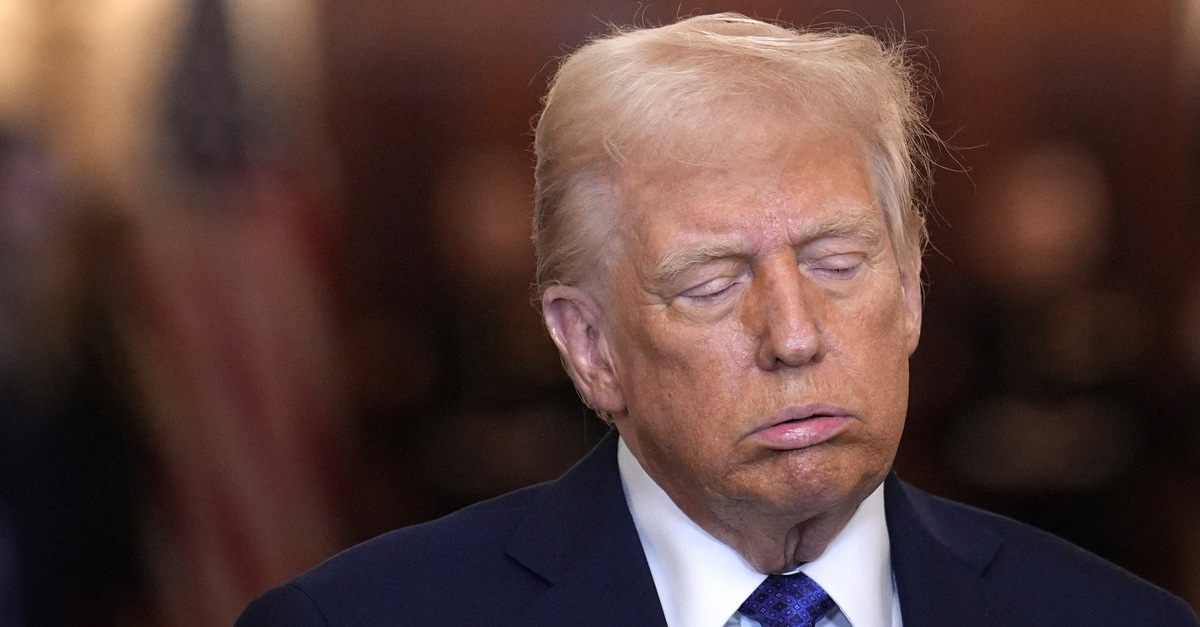The Justice Department is imploring a federal appeals court to halt a lower court’s order directing the government to “immediately” restore large swathes of federal funding across multiple agencies, referring to the judge’s order as an “extraordinary usurpation of the President’s executive power.”
In a scathing 23-page motion filed Monday in the U.S. Court of Appeals for the First Circuit, the DOJ took aim at U.S. District Judge John McConnell’s allegedly “unprecedented” power grab, asking the appeals court to issue an administrative stay that would stop McConnell’s order from taking effect by 10 a.m. Tuesday... Continue reading here ▶
“This appeal arises from an extraordinary and unprecedented assertion of power by a single district court judge to superintend and control the Executive Branch’s spending of federal funds, in clear violation of the Constitution’s separation of powers,” the filing states.
“To put a halt to this intolerable judicial overreach, this Court should stay the orders under review pending disposition of this appeal, and should enter an immediate administrative stay of the orders until the motion for stay pending appeal is resolved.”
Earlier in the day Monday, McConnell granted a “motion for enforcement,” ordering the administration to “immediately restore frozen funding” and “end any federal funding pause” during the pendency of the temporary restraining order he first issued on Jan. 31. In that order, the Barack Obama-appointed judge reasoned that the spending freeze was both unconstitutional and in violation of a federal law that blocks government action deemed “arbitrary and capricious.”
“The States have presented evidence in this motion that the Defendants in some cases have continued to improperly freeze federal funds and refused to resume disbursement of appropriated federal funds,” McConnell wrote in the five-page order. “The broad categorical and sweeping freeze of federal funds is, as the Court found, likely unconstitutional and has caused and continues to cause irreparable harm to a vast portion of this country. These pauses in funding violate the plain text of the TRO.”
The DOJ categorized McConnell’s “sweeping order” as a “broad incursion on the orderly operation of government and the president’s Article II authority to control the executive branch,” adding that it prevents “much of the federal government” from exercising their constitutional powers.
McConnell’s ruling came in response to a lawsuit filed by 23 Democratic state attorneys general, led by New York AG Letitia James.
The memo at the heart of the litigation — issued on Jan. 27, by the Office of Management and Budget — purported to make good on a series of executive orders issued by President Donald Trump outlining the administration’s spending priorities.
The memo required federal agencies to “pause all activities related to obligation or disbursement of all Federal financial assistance, and other relevant agency activities that may be implicated by the executive orders, including, but not limited to, financial assistance for foreign aid, nongovernmental organizations, DEI, woke gender ideology, and the green new deal.”
The directive caused mass confusion throughout entities dependent on the federal government for funding as entire payment portals and websites went dark overnight. In response to the widespread panic and disorientation, the administration issued a terse directive rescinding the original memo
Despite the rescission, multiple lawsuits were filed claiming the administration was still enacting the measure and several judges, including McConnell, issued orders blocking the policy from taking effect.
However, the plaintiff states on Friday accused the administration of violating McConnell’s order, telling the court that since the TRO went into effect, there continued to be “an ever-changing kaleidoscope of federal financial assistance that has been suspended, deleted, in transit, under review, and more.”
McConnell on Monday rejected the DOJ’s assertion that much of the delay in resuming funding was due to an “unusually large number of entities that attempted to draw down funds in PMS [the Payment Management System], with many recipients requesting larger-than-normal amounts, sometimes up to their full grant balance.”
“The Defendants now plea that they are just trying to root out fraud,” he wrote. “But the freezes in effect now were a result of the broad categorical order, not a specific finding of possible fraud,” he wrote.
“The Court’s TRO is clear and unambiguous in its scope and effect, which is inconsistent with the Defendant’s interpretation. The Defendants must immediately restore withheld funds, including those federal funds appropriated in the Inflation Reduction Act and the Infrastructure Improvement and Jobs Act.”
The DOJ struck back in its appeal motion, criticizing the breadth of McConnell’s order, noting that it was premised on “a lawsuit that ostensibly challenges a single memorandum from [OMB], which OMB has already rescinded.”
“A single district court judge has attempted to wrest from the President the power to ‘take Care that the Laws be faithfully executed,’” the DOJ wrote, quoting directory from the U.S. Constitution. “This state of affairs cannot be allowed to persist for one more day. A stay pending appeal is warranted.”
